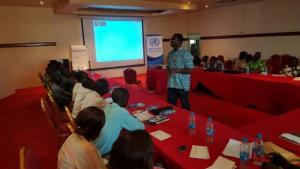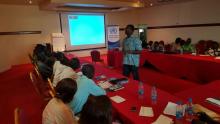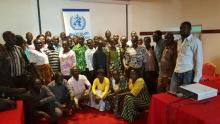WHO strengthening the capacity of laboratory personnel to intensify cholera and meningitis surveillance in South Sudan
20 January 2017, Juba, South Sudan – Public health laboratories are a critical component of communicable disease detection, prevention, and control. However, access to reliable laboratory testing remains limited in in sub-Saharan African countries including South Sudan.
For efficient and improved quality of laboratory service delivery, WHO South Sudan supported the Ministry of Health to harmonize and strengthen the capacity of the laboratory personnel on basic and advanced laboratory diagnostic techniques from 16 to 20 January 2017.
The objective was to enhance systems for routine laboratory operations at all levels in order to guide decision-making processes by clinicians, public health specialists, and health policy makers for the attainment and maintenance of International Health Regulations (IHR) core capacities in South Sudan.
In an effective and efficient health system, laboratory service plays a critical role, however, this is not the case in many African countries including South Sudan, says Dr. Abdulmumini Usman, the World Health Organization Representative to South Sudan. “The need for building laboratory diagnostic capacity is crucial for improved laboratory support to surveillance and treatment of communicable diseases”, he added. We appreciate the support from our partners especially the European Civil Protection and Humanitarian Aid Operations (ECHO) that provide funding support in this area.
In today’s interconnected world, the risk of international spread of infectious diseases has greatly increased. The core capacity of the International Health Regulations (IHR) 2005 obligates World Health Organization (WHO) Member States to establish mechanisms for providing reliable and timely laboratory identification and characterization of infectious agents and other hazards likely to cause public health emergencies of national and international concern, including shipment of specimens to the appropriate laboratories if necessary. Laboratory services therefore play a major role in all the key processes of the IHR, including detection, assessment, response, notification, and monitoring of events.
WHO committed to continue to support the Ministry of Health to strengthen and harmonize health laboratories for disease surveillance and response. WHO with funding from ECHO has been supporting the laboratory services at different levels for efficient and effective diagnosis of diseases through the provision of supplies including rapid diagnostic tests and transport media for epidemic prone diseases.
____________________________________________
For more information please contact:
Dr Allan Mpairwe, +211 955 372 370, mpairwea [at] who.int (mpairwea[at]who[dot]int) Ms Jane Pita, +211 955 536818, janep [at] who.int (janep[at]who[dot]int)
Ms Jemila M. Ebrahim, +211 950 450 007, ebrahimj [at] who.int (ebrahimj[at]who[dot]int)
Below:
01. 01 Dr Otim Patrick Cossy, making a presentation on identifying and reporting priority diseases
02. Participants posing for a group photo





